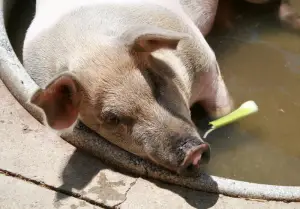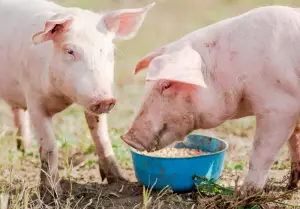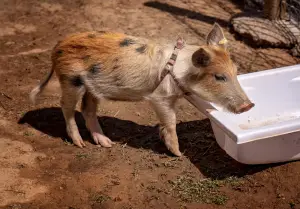Causes And Solutions For Pigs That Won’t Eat
Pigs have a well-earned reputation for their love of eating, as evidenced by their willingness to eat almost anything and their tendency toward obesity. If your pig isn’t eating, you know there has got to be a reason, and it is important that you find that reason quickly.
Why is your pig not eating? There are a number of reasons a pig may have a loss of appetite, including dehydration, infection or other illness, heat, or an injury preventing her from getting to her feed. In all of these situations, it is important to remedy the issue quickly to prevent suffering or further deterioration.
Pigs are especially hardy animals, and will not show signs of illness until they are in a dangerous predicament. For this reason, if you notice a marked decrease in appetite from your pig, it is important to take appropriate measures as quickly as possible. Read on to learn more about the reasons behind loss of appetite, as well as appropriate remedies.
Reasons That Pigs Might Not Eat
Pigs Might Not Eat If Dehydrated
One of the most common reasons that a pig will stop eating is because of dehydration. Pigs need a large amount of water to stay hydrated – from an average of 1.5 gallons per day for a grower pig to 6 gallons of water per day for a lactating sow.
Pigs who are dehydrated may show a number of signs including sunken eyes, dry noses, decreased urination, and lethargy. Lethargy on its own can have a significant impact on the health of a pig, as a lethargic pig does not want to expend the energy required to eat.
There are a number of reasons that a pig may become dehydrated. Pigs with diarrhea will quickly become dehydrated because of the rapid loss of fluid. A pig without access to clean, fresh water may also become dehydrated due to the refusal to take in dirty or algae-covered water. And of course, a pig will be unable to properly hydrate if not provided adequate amounts of water.
What To Do If Your Pig Is Dehydrated
Your remedy for dehydration will depend on the cause. If your pig has diarrhea, the cause of the symptom needs to be investigated. Diarrhea can be a symptom of a parasitic, viral, or bacterial illness. Or, it can be a symptom of toxicity. If you suspect your pig has a parasitic infestation, administering the appropriate dewormer will be the solution. If you suspect a viral or bacterial illness, or a poisoning, it is best to contact a veterinarian for advice.
If your pig is healthy and not drinking water, chances are the problem is in the water itself. Ensure that you are providing ample clean water. Clean the watering pans regularly so there is no algae build-up, and make sure to change the water at least daily.
If you have a large area, place watering pans in multiple locations to make it easy for your pigs to stay hydrated. And keep the water in a shaded area when the weather is warm; no one wants to drink warm water on a hot day.
Pigs Might Not Eat If Overheated 
Pigs are especially susceptible to heat stress, and this can quickly cause the reduction of feed intake by 25-50%. If you are experiencing a heat wave, or if the weather has taken a sudden Spring turn, you may notice a lack of appetite within your herd.
What To Do If Your Pig Is Too Hot
If you suspect your pig is uncomfortably hot, you need to take steps to cool her off. Make sure that your pig has access to adequate shade and plenty of cool, fresh water. You may also use the hose or sprinkler to offer temporary and quick relief. Pigs often keep cool by rolling in the mud; if you can, offer her a mud pit or a shallow kiddie pool. Once your pig is cooled off, you should notice an increase in consumption.
Pigs Might Not Eat If Constipated
If nothing is coming out, there is no room to take anything in. Constipation is not as common a problem in pigs as in some other animals, but is most often a result of dehydration (see above) or loss of fluids in a recent farrowing (birth). Signs of constipation include lack of defecation and, when defecating, small and hard stools. A constipated pig may increase water intake while decreasing feed intake.
What To Do If Your Pig Is Constipated
If your pig is indeed dehydrated, it is important to determine the cause. Ensure that your pig has access to plenty of cool, clean water (see above tips), and encourage drinking. If your pig is not drinking enough, you can add some kool-aid or honey to the water – pigs love sweets. You can also try offering watermelon to increase fluids.
If you have a sow who has recently farrowed, you can add laxatives such as Epsom Salt to her feed. You can also encourage 10-15 minutes of exercise at a time to get the digestive system moving.
Pigs Might Not Eat If Injured
If your pig is lame or otherwise injured, he may not be able to comfortably make it to the feed. If your pig is not moving around much, it is important you give a visual inspection. You may notice an obvious injury. If not, but you suspect pain, there may be an internal injury like a fracture.
What To Do If Your Pig Is Injured
If your pig is injured, you will probably need to call a vet. Some injuries will be easy to treat, while others will be more challenging. If the injury is difficult to treat (like a broken leg) and your meat pig is close to a finishing weight, you may want to go ahead and call the butcher early. If you choose this last option, however, be sure to check local regulations. In many areas a butcher is not allowed to slaughter a “downed” animal.
Pigs Might Not Eat If Sick 
There are multiple viral, bacterial, and parasitic infections that can afflict pigs. Many of these may include lack of appetite as a symptom.
- Viral Infections – Swine Flu is the illness that will come to mind when most of us think about viral illnesses that can affect pigs. While Swine Flu is a worrisome virus, there are other viruses of concern that can impact pigs including Foot-and-Mouth, Porcine Reproductive and Respiratory Syndrome, and Gastroenteritis. With most viral infections, symptoms will include loss of appetite.
- Bacterial Infections – A bacterial infection may become present on its own, or it may follow a viral infection. Bacterial infections in pigs include pneumonia, leptospirosis, and Clostridium perfringens. Loss of appetite is often the first symptom of a serious bacterial infection.
- Parasitic Infections – Parasitic infestations are not uncommon in pigs, and some of the most common symptoms include weight loss, diarrhea, and loss of appetite. There are many parasites that can affect pigs, including large roundworms, whipworms, and Strongyloides.
What To Do If Your Pig Is Sick
If you suspect your pig is sick and you are not sure what to do, or what is causing the illness, it is always advised that you contact a veterinarian. Not only is your pig’s life at stake, but you may have an illness on your hands that can affect the entire herd (or other animals on the farm).
In the case of viral illness, supportive measures are usually all that can be taken. Some viruses, like the Swine Flu, will cause a herd to be ill but will not usually cause death. With other viruses, such as Foot-and-Mouth, the best approach, unfortunately, is to cull the herd.
Bacterial infections can often be treated in pigs through the use of a broad-spectrum antibiotic. Antibiotics used in pigs include the penicillin and tetracycline classes of medication. Many livestock antibiotics can be purchased over-the-counter at farm supply and feed stores.
Some parasitic infections can be managed by the immune system of a healthy adult pig, while others will need intervention. There are dewormers available over the counter online and in feed stores that can help eradicate parasitic infestations. Popular dewormers include ivermectin, fenbendazole, and levamisole.
Some treatments are better at treating certain parasites, so make sure to read the label. Because piglets are highly susceptible to parasitic infestations, it is often recommended that sows be dewormed prior to farrowing, piglets at birth, and again at weaning.
When It’s Time To Call In The Experts
If you are unable to determine the cause of your pig’s loss of appetite, or if you are not equipped to remedy the cause, it’s time to call in the veterinarian. Your vet may be able to guide you in the right direction through a simple phone call, or he or she might want to perform an exam, fecal, and/or blood test. When in doubt, you will want to err on the side of caution, especially if there is a possibility of spreading a contagious disease to the rest of the herd.

